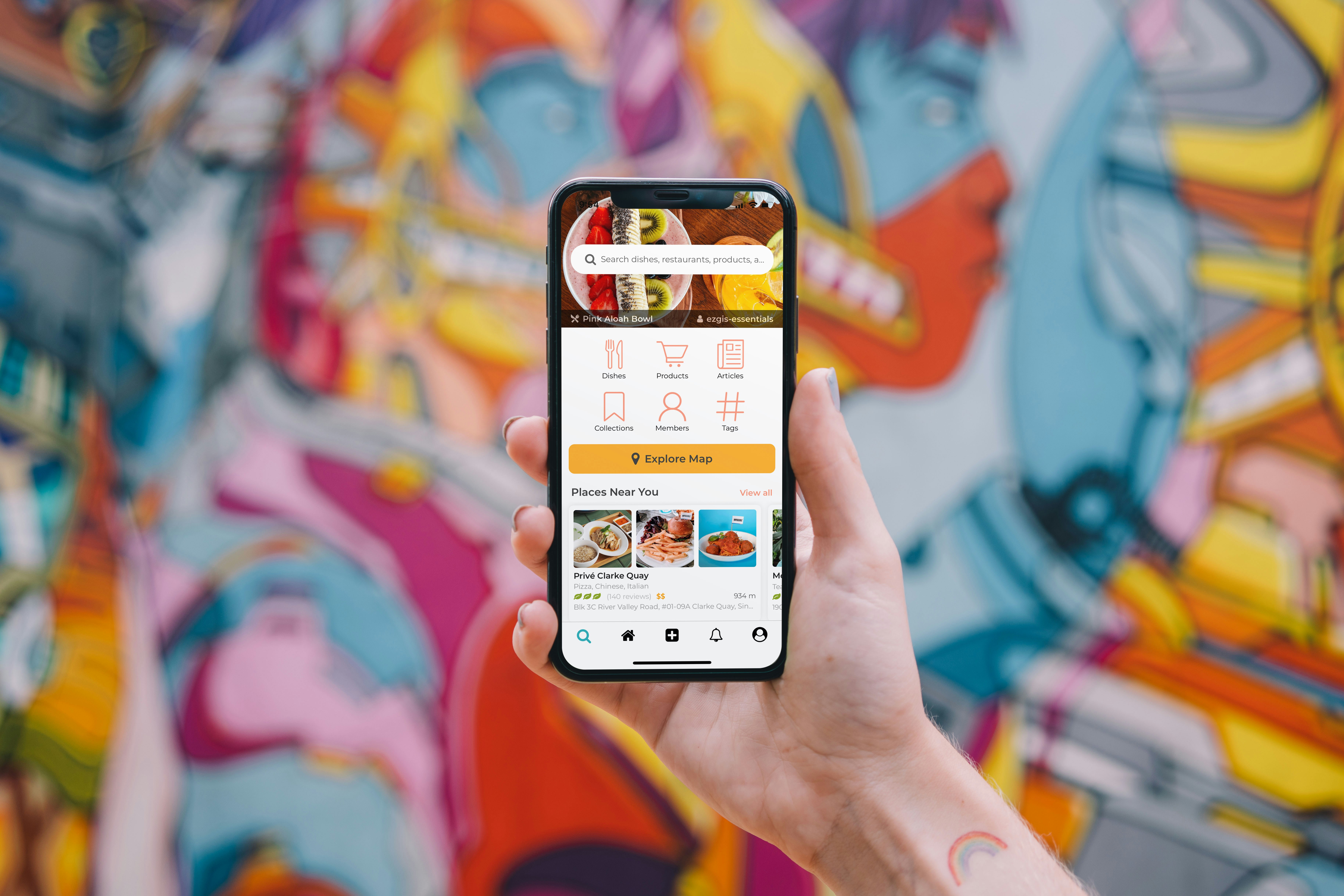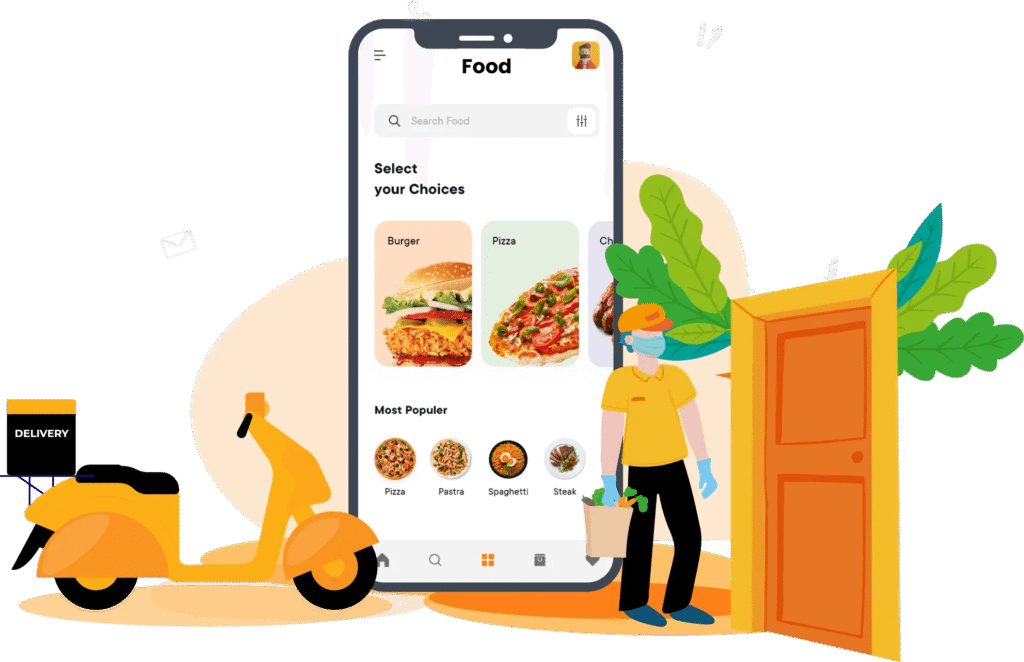Table of Contents
ToggleIntroduction to Delivery Service Apps in Qatar
The landscape of consumer behavior in Qatar has undergone a significant transformation, particularly with the advent of delivery service apps. As busy lifestyles and the convenience of online interactions continue to gain prominence, the demand for efficient food delivery services has surged. These applications have reshaped how residents engage with local businesses, allowing greater accessibility to a variety of cuisines and dining options without the need to physically visit restaurants.
In the current market, key players such as Talabat, Snoonu, and Rafeeque dominate the scene, each offering unique features tailored to meet the diverse needs of consumers. Talabat has established itself as a leader, providing a wide array of food options alongside convenient payment solutions. Snoonu, on the other hand, differentiates itself with its focus on speedy delivery and a visually appealing interface, catering to a tech-savvy audience. Rafeeque, with its emphasis on local businesses, plays a crucial role in enhancing community engagement while promoting smaller eateries that might otherwise struggle for visibility.
The rapid adoption of delivery service apps is not solely a trend confined to Qatari culture; it reflects a broader global shift towards digitalization in the food and beverage industry. As consumers continue to embrace online food ordering, businesses are incentivized to adopt innovative approaches to service delivery, ensuring a competitive edge in this growing market. This scenario creates a lucrative atmosphere for prospective entrepreneurs interested in developing a Delivero clone app. By leveraging existing platforms’ success and identifying shortcomings in service delivery, new entrants can position themselves strategically to capture segments of this expanding customer base.
Overview of Talabat
Founded in 2004 in Kuwait, Talabat has become a prominent player in the food delivery sector in Qatar and the broader Middle East region. As one of the earliest platforms to introduce online food ordering, Talabat set a precedent for the industry by connecting consumers with their favorite local restaurants seamlessly. Over the years, it expanded its service offerings and geographical reach, solidifying its status as a leading food delivery platform in Qatar.
Talabat’s growth can be attributed to several key factors. The platform’s user-friendly interface enhances the overall customer experience, allowing users to browse various menus, read reviews, and customize orders effortlessly. Additionally, Talabat leverages technology to optimize delivery routes and reduce wait times, making it a preferred choice among consumers. The integration of features such as live tracking ensures that customers remain informed of their order’s status, thus enhancing transparency and trust in the service.
The business model of Talabat primarily revolves around a commission-based structure, where partnering restaurants pay a percentage of each order to the platform. This model incentivizes Talabat to onboard a wide range of restaurants, contributing to its extensive database of dining options. Partnerships with local establishments have not only increased Talabat’s restaurant variety but have also stimulated the local food industry’s growth, allowing smaller eateries to reach a larger audience.
Furthermore, Talabat has played a pivotal role in changing consumer habits in Qatar. With the increasing trend towards dining convenience, many users have shifted from traditional dining to digital ordering. This shift not only reflects a growing preference for convenience but also signifies a cultural transition towards adopting technology in daily life. As Talabat continues to innovate and expand, its impact on the local food landscape in Qatar is likely to evolve further, shaping the future of food delivery.
Understanding Snoonu’s Unique Offerings
Snoonu has emerged as a noteworthy player in the delivery service market of Qatar, establishing itself through a range of unique selling propositions. One of its standout features is its emphasis on user experience. The application boasts an intuitive interface that promotes ease of navigation, allowing users to place orders with minimal effort. This streamlined process not only accelerates the ordering experience but also enhances customer satisfaction, setting Snoonu apart from its competitors, including Talabat.
Another critical aspect of Snoonu’s offerings is the diversity of services it provides. Unlike traditional food delivery applications, Snoonu goes beyond just meal deliveries. It offers a comprehensive range of services from groceries to pharmacy items and logistics, catering to a wider audience. This expansion into various service areas not only increases its user base but also positions it uniquely to meet the varying demands of Qatari consumers. The ability to order from multiple categories within a single app enhances convenience, which is highly appealing in today’s fast-paced environment.
Pricing strategies also play a vital role in Snoonu’s competitive approach. The app frequently rolls out promotional offers and discounts, ensuring that its services remain accessible to a broad demographic. This focus on competitive pricing can be particularly attractive when compared to Talabat, which often has a more rigid pricing structure. By maintaining a flexible pricing model, Snoonu can effectively respond to market changes and consumer needs, further solidifying its presence in the delivery service landscape of Qatar.
In summary, Snoonu’s unique offerings, which encompass an exceptional user experience, diverse service categories, and strategic pricing, position it as a formidable competitor in Qatar’s delivery service sector, particularly against established players like Talabat.
The Rise of Rafeeque
Rafeeque has emerged as a notable player in the fast-evolving delivery service industry in Qatar, carving a distinct niche in a competitive landscape marked by established players. Launched in response to the growing demand for convenient and fast delivery solutions, Rafeeque aims to cater to a diverse range of customers, from busy professionals requiring prompt food delivery to families seeking reliable grocery options. Its user-friendly application is designed with a keen focus on customer experience, ensuring a seamless interaction from the moment the order is placed until it arrives at the customer’s doorstep.
Since its inception, Rafeeque has experienced significant growth, driven by its commitment to exceptional service and a comprehensive delivery network. Understanding the unique needs of the Qatari market, the platform extends its offerings beyond food to include everyday essentials, thereby attracting a broader audience. Moreover, Rafeeque employs a local approach, utilizing a fleet of riders who are familiar with the region’s neighborhoods, which further enhances delivery speed and efficiency.
However, Rafeeque faces challenges typical in the delivery sector, including intensifying competition from both local and international services, fluctuating operational costs, and the constant need for technological enhancements to meet customer expectations. To counteract these obstacles, Rafeeque has implemented strategies focused on community engagement and customer feedback, allowing the app to evolve based on direct input from users. Furthermore, promotional campaigns and partnerships with local businesses have solidified Rafeeque’s presence in the market, setting it apart from other apps. By continuously refining its offerings and maintaining a robust connection with its user base, Rafeeque is establishing itself as a formidable contender in Qatar’s delivery service landscape.
Market Trends and Consumer Preferences
The delivery service industry in Qatar is experiencing a significant transformation, influenced by various market trends and evolving consumer preferences. A notable trend is the increasing shift towards online ordering, driven by the rapid adoption of smartphones and internet connectivity. Consumers are gravitating towards convenience, preferring to place orders from the comfort of their homes or while on the go, which has led to a surge in the use of delivery service apps like Talabat, Snoonu, and others.
Additionally, the consumer preference landscape is changing. Today’s customers prioritize speed and efficiency, expecting their orders to be delivered within a short timeframe. This demand for quick service is prompting delivery apps to optimize their logistics, ensuring better route management and real-time tracking features. Moreover, the integration of artificial intelligence and machine learning in these applications allows for personalized experiences, catering to unique customer needs and preferences.
With the growing trend of health and wellness, many consumers are also inclined towards healthy food options. Delivery service apps are adapting their offerings to include healthier choices, thus appealing to this demographic. Furthermore, customer engagement through promotions, discounts, and loyalty programs has become a crucial tactic for retaining users in a competitive market.
Technology plays a pivotal role in shaping these trends, as innovations in app functionality and usability enhance the overall customer experience. Delivery service apps are focusing on user-friendly interfaces and seamless payment options to further attract consumers. The incorporation of features such as in-app customer feedback systems fosters a sense of community and encourages user retention.
As the Qatari market continues to evolve, understanding these trends and consumer behaviors will be essential for delivery service providers and app developers alike, allowing them to remain competitive in this dynamic landscape.
Challenges Faced by Delivery Apps in Qatar
The delivery service sector in Qatar has witnessed significant growth, leading to the proliferation of various apps such as Talabat, Snoonu, and Rafeeque. However, the rapid expansion of these services comes with its set of challenges that must be addressed for sustained success. One of the foremost issues relates to logistics. Efficient delivery requires a robust logistical framework, and any shortcomings can lead to delays, impacting customer satisfaction. Delivery apps must invest heavily in technology to optimize routing and manage their fleets effectively to mitigate these logistic challenges.
Competition is another critical challenge in the delivery app landscape. As more players enter the market, companies face pressures to differentiate themselves while maintaining competitive pricing. This environment can lead to a ‘race to the bottom’ where the focus may shift to price over quality, ultimately affecting service reliability and customer trust. Delivery apps in Qatar must not only offer competitive rates but also emphasize quality service as a key differentiator to retain customers in a saturated market.
Regulatory hurdles present yet another obstacle for delivery service apps. The regulatory framework governing transport and food delivery can be complex, requiring compliance with various local laws and regulations. Companies must stay abreast of any changes in legislation that could impact their operations, including licensing, labor laws, and health and safety standards. Navigating these bureaucratic challenges often necessitates dedicated legal and compliance teams, which can strain resources, especially for smaller apps.
Finally, maintaining customer satisfaction in such a dynamic environment is paramount. Factors such as service speed, order accuracy, and food quality directly influence customer experience. Delivery apps must develop robust feedback mechanisms to address complaints and improve service continuously. By prioritizing customer engagement and satisfaction, these platforms can build loyalty amidst the myriad challenges they face, effectively positioning themselves for long-term success in Qatar’s food delivery industry.
Opportunities for New Entrants: The Delivero Clone App
The burgeoning delivery service market in Qatar presents a fertile ground for new entrants, particularly those looking to create a Delivero clone app. With an increasing reliance on digital convenience, the demand for on-demand food and goods delivery services continues to grow. This creates a significant opportunity for startups and entrepreneurs aiming to capitalize on this market trend.
To succeed, new developers must understand the essential features that make a delivery app competitive. A user-friendly interface, real-time tracking, multiple payment options, and efficient customer support are foundational elements that can enhance the user experience. Additionally, incorporating advanced features such as AI-driven recommendation systems, loyalty programs, and seamless integration with local restaurants can further enhance an app’s appeal and functionality. Moreover, utilizing geolocation technology ensures efficient routing and delivery logistics, which are critical for client satisfaction.
In terms of technology, it is crucial for new entrants to consider scalable and reliable app development frameworks. Utilizing cloud-based infrastructure can facilitate increased user loads as the app gains popularity, ensuring that performance remains optimal. Also, adopting a robust backend system that supports payment processing and database management is necessary for maintaining secure operations and user trust.
Market entry strategies play a vital role in the successful launch of any delivery app. New entrants should focus on distinguishing their offerings from established competitors. Engaging with local businesses for exclusive partnerships can amplify visibility and foster a sense of community support. Targeted marketing campaigns leveraging social media channels, along with promotions and discounts for first-time users, can boost initial engagement. Furthermore, building an appealing brand narrative can resonate with potential customers and create loyalty.
In conclusion, the opportunity for new entrants to develop a Delivero clone app in Qatar is significant. By focusing on essential features, leveraging technology, and implementing strategic marketing approaches, startups can carve their niche in this growing market.
Essential Features of a Successful Delivery App
In the highly competitive landscape of delivery services, the success of a delivery app hinges upon several crucial features that enhance user experience and operational efficiency. A user-friendly interface is paramount; it serves as the first point of interaction between the customer and the service. The user experience extends beyond just aesthetics, integrating intuitive navigation that allows users of all tech-savviness levels to place orders effortlessly. An effective design can dramatically decrease order times and increase overall customer satisfaction.
Another indispensable feature is real-time tracking. Customers demand transparency regarding their orders, and incorporating GPS technology allows them to monitor their deliveries in real time. This not only enhances trust but also provides customers with peace of mind. Additionally, transparent tracking can help businesses address delays or issues proactively, which can further contribute to user loyalty in the long run.
Secure payment gateways are also a fundamental aspect of any delivery app. Customers need assurance that their financial information is safeguarded during transactions. Integrating multiple payment options, including credit cards, digital wallets, and even cash on delivery, offers flexibility and enhances user convenience. The implementation of robust security measures, such as encryption, is essential to mitigate risks associated with online payments, thus elevating the overall credibility of the app.
Finally, excellent customer support is vital for any successful delivery service. An efficient support system, whether via in-app chat, email, or phone, can resolve user issues swiftly and effectively. Prompt and helpful customer service can often salvage negative experiences and turn them into positive ones, fostering loyalty and encouraging users to choose the service repeatedly. By prioritizing these essential features—an intuitive interface, real-time tracking, secure payments, and responsive customer support—delivery apps can significantly enhance the user experience, driving success in the competitive market of delivery services.
Conclusion: The Future of Delivery Services in Qatar
The landscape of delivery services in Qatar is rapidly evolving, characterized by intense competition among established players like Talabat, Snoonu, and Rafeeque. These platforms have set high standards for quality, speed, and customer satisfaction, driving the industry towards greater innovation. As consumer preferences continue to shift towards convenience and efficiency, the delivery service sector must adapt accordingly to meet these demands. New entrants, such as the Delivero clone app, exemplify the potential for fresh ideas and technologies to disrupt the market, offering unique features that cater to niche audiences.
Furthermore, innovation plays a crucial role in shaping the future of delivery services in Qatar. The integration of advanced technologies, such as artificial intelligence and machine learning, is essential for optimizing delivery routes, enhancing user experiences, and ensuring timely services. Moreover, the emergence of environmentally sustainable practices within the industry can help integrate societal expectations and regulatory requirements into the business models of delivery apps. This highlights the necessity for existing and upcoming service providers to remain agile and responsive to the evolving landscape.
In this competitive environment, it is vital for delivery apps to not only maintain high service standards but also engage in effective marketing strategies to capture and retain customers. Collaboration with local businesses can further enrich the offerings of these platforms, ensuring a comprehensive selection of services and products for consumers. As such, the future of delivery services in Qatar appears promising, driven by a combination of established companies and innovative newcomers. The ability to quickly adapt to changing trends, efficiently utilize technology, and prioritize customer satisfaction will determine the leaders of tomorrow in this bustling market.







